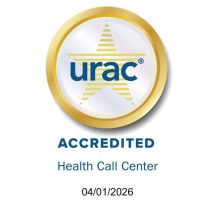When people have health concerns, particularly when practices are closed, they may seek care from an emergency room (ER) because they are not sure about the severity of their own or their loved one’s symptoms. Telephone triage nurses use standardized triage protocols to evaluate symptoms over the phone and determine the appropriate level of care for the patient.
Triage nurses must also have excellent listening skills so that they may collect the crucial medical information needed. In many cases, nurses can prevent an ER visit by giving home care instructions. In other cases, nurses direct patients to the emergency room and prevent unnecessary health complications caused by not seeking care right away. In either instance triage nurses should maintain a high level of empathy as the patient calling may often be tired, frustrated or in pain which can occasionally lead to the call quickly escalating into a difficult conversation.
In this article, we present important tools for the job so that resolutions can be made as efficiently as possible. No matter what profession you work in, or what line of business it is, if you answer a lot of phone calls you are bound to have a difficult caller at one point or another – and possibly several at a time.
Successful people know how to handle callers in a manner that diffuses caller frustration while keeping everyone from losing their cool. To that end, this article discusses a few examples of difficult calls triage nurses may come across and tips for how to manage them.
Types of Difficult Callers
There are many types of difficult callers and each one requires special tactics in order to keep emotions from escalating.
- Angry or Frustrated Callers can be a challenge, but you can manage the conversation with three steps:
- LISTEN – so that you truly understand the problem or concern. Occasionally interject supportive words or short phrases such as “I understand”, or “Yes, I see.”
- RELATE – apologize in a general sense. You do not want to admit a mistake if you have not made one, but you can offer a broader apology such as “I am sorry about the confusion” or relate by saying “I understand how you must feel.”
- PROPOSE – an Action Plan that will solve the problem. Based on what the concerns are you can suggest a solution or at least a step that will lead in the right direction. This may include phrases such as “I would like to help you. How about if I….” or “I would like to help fix this for you, can I bring my supervisor in on this call to assist you?”
- Abusive callers can really test your patience and tact. Nobody deserves to be abused, and that includes YOU! To deflect abusive callers:
- Give the client the benefit of the doubt by politely letting them know that you want to assist them, but that it is difficult when they are speaking in that manner.
- If that doesn’t work, repeat what you said and ask them to please stop using that language. “As I said, I would really like to help, but I am having trouble focusing on the problem when you speak that way. Please stop and listen to me for a moment so that we can work this out.”
- On the third strike, inform the caller that you are no longer the person who can assist him, and let him know you are going to hang up and have a manager call him. Before you hang up though make sure you first say, “I am sorry, but I am going to hang up now” and then do it.
It is in Your Hands
Overall, the outcome of dealing with a difficult caller depends on YOU. It is not always easy, but if you approach the manner effectively, you should be able to reach an agreeable resolution. To that end, it is important to remember:
- Someone else’s anger is about them, not you, so do NOT take it personally.
- Put yourself in their shoes, even if you do not know what is really bothering them. They are potentially either sick, scared, tired, or some combination of the three. We all know how that feels, so having a little empathy can completely change how a call goes. Understanding and friendliness go a LONG way to help diffuse even the most formidable person. Make it a personal challenge to turn around even the most difficult callers.
In the modern age, when technology is a part of our day-to-day lives, it is important to learn how to communicate effectively on the phone so that you may provide the best possible care and facilitate the break down as many barriers as possible in this new form of healthcare. Using the applicable tools above, you can achieve this and effectively ease the minds of any patients that may call in. In doing so, you can help them receive the appropriate amount of care and rest easy knowing that you have done your crucial part in getting your patient taken care of.
Contact us today to set up a nurse triage system for your patients. We will discuss your needs and set up a customized plan that works best for your organization and your patients.













